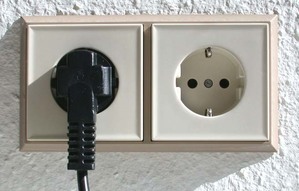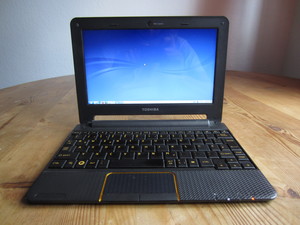Sunday, September 29. 2013
226 Kilowattstunden
 Ich habe gerade die Jahresabrechnung von meinem Stromanbieter bekommen. 452 Kilowattstunden für einen 2-Personen-Haushalt. Zum Vergleich: Der Durchschnitt liegt bei circa 3200 Kilowattstunden. Mein Stromanbieter sagt mir, dass 1000-2000 Kilowattstunden in meinem Fall bereits "sehr gut" wären - mein Stromverbrauch ist in der dargestellten Übersicht überhaupt nicht vorgesehen.
Ich habe gerade die Jahresabrechnung von meinem Stromanbieter bekommen. 452 Kilowattstunden für einen 2-Personen-Haushalt. Zum Vergleich: Der Durchschnitt liegt bei circa 3200 Kilowattstunden. Mein Stromanbieter sagt mir, dass 1000-2000 Kilowattstunden in meinem Fall bereits "sehr gut" wären - mein Stromverbrauch ist in der dargestellten Übersicht überhaupt nicht vorgesehen.Zugegeben hab ich einige Vorteile, auf die man zumindest als Mieter meist wenig Einfluss hat. Die Wohnung hat einen Gasherd und die Heizung läuft via Fernwärme. Die in vielen Wohnungen größten Stromverbraucher fallen damit weg. Ansonsten mache ich aber nur Dinge, die relativ banal sind:
- Beim Kauf von *allen* elektronischen Geräten versuche ich auf den Stromverbrauch zu achten. Leider ist das oft schwierig - denn in vielen Fällen verschweigen einem die Hersteller den Stromverbrauch.
- Besonderes augenmerk auf a) Großgeräte und b) Geräte, die permanent laufen. Das bedeutet vor allem: Kühlschrank und Waschmaschine sollten sparsam sein, aber auch so Dinge wie Telefon, Router oder Modem. Die brauchen zwar nicht viel, laufen aber immer oder fast immer.
- Alle Geräte, die aktuell nicht gebraucht werden, werden ausgeschaltet. Für meinen Schreibtisch bedeutet das etwa: Eine Steckdosenleiste, an der sich jede Dose einzeln abschalten lässt.
- Geräte, die multifunktional sind und sowieso wenig Strom brauchen, sollte man auch multifunktional nutzen. Beispiel Laptop: Die sind generell sehr stromsparend, damit der Akku lange hält. Einen Desktop-PC zu nutzen, wenn es der Laptop auch tut, ist sinnlos. Musik und Filme kann man ebenfalls damit abspielen.
(Bildquelle: Wikimedia Commons)
Thursday, September 19. 2013
Improved SSD performance on old Thinkpads with BIOS mod
Recently, my old harddisk produced some errors. As I care for my data, I immediately replaced it and decided to invest in an SSD.
My laptop (Lenovo Thinkpad T61) is already some years old, so I'm quite aware that I won't get the best possible performance out of it. But I found something really interesting. The BIOS seems to limit the SATA II speed and there's an unofficial BIOS mod to remove that limitation. It's also available for a couple of other Thinkpad models (beside T61 also for R61, X61, X300 and variants of them).
The BIOS mod also does a number of other things, for example the official BIOS has a whitelist of allowed wireless chips. That gets removed.
The full feature list from the readme file:
- Disabled whitelist check.
- Enabled SATA II full speed.
- Added SLIC 2.1 table.
- Removed "Thermal sensing error" boot message (Penryn CPUs).
- Added dual-IDA support.
Obivous Warning: You're doing this at your own risk. If any unofficial BIOS destroys your laptop or your data, that's bad luck. The only thing I can tell is that I didn't experience any problems and that so far, a lot of people seem to use these BIOS mods without problems.
Now I did some before-after-benchmarking. I used hdparm -tT /dev/sda and a simple dd if=/dev/zero of=/tmp/out.img bs=8k count=256k. I started the benchmark after a fresh boot without anything else running to avoid disturbances. I ran the tests a couple of times and will only give you the last result of each tests, but they didn't differ much. The results:
Quite impressive, isn't it? I just doubled the speed of my disk for free. I'm aware that benchmarking is a tricky business and the impact this has on my overall system performance is probably difficult to put in numbers, but the results are significant enough that I think it was worth it.
Slightly related: There's also a modified firmware for the Optiarc AD7910A CD/DVD burner that's shipped in my laptop.
My laptop (Lenovo Thinkpad T61) is already some years old, so I'm quite aware that I won't get the best possible performance out of it. But I found something really interesting. The BIOS seems to limit the SATA II speed and there's an unofficial BIOS mod to remove that limitation. It's also available for a couple of other Thinkpad models (beside T61 also for R61, X61, X300 and variants of them).
The BIOS mod also does a number of other things, for example the official BIOS has a whitelist of allowed wireless chips. That gets removed.
The full feature list from the readme file:
- Disabled whitelist check.
- Enabled SATA II full speed.
- Added SLIC 2.1 table.
- Removed "Thermal sensing error" boot message (Penryn CPUs).
- Added dual-IDA support.
Obivous Warning: You're doing this at your own risk. If any unofficial BIOS destroys your laptop or your data, that's bad luck. The only thing I can tell is that I didn't experience any problems and that so far, a lot of people seem to use these BIOS mods without problems.
Now I did some before-after-benchmarking. I used hdparm -tT /dev/sda and a simple dd if=/dev/zero of=/tmp/out.img bs=8k count=256k. I started the benchmark after a fresh boot without anything else running to avoid disturbances. I ran the tests a couple of times and will only give you the last result of each tests, but they didn't differ much. The results:
| before | after | |
| hdparm cached read | 3069.01 MB/s | 6900.56 MB/s |
| hdparm buffered read | 131.38 MB/s | 251.79 MB/s |
| dd write | 106 MB/s | 209 MB/s |
Quite impressive, isn't it? I just doubled the speed of my disk for free. I'm aware that benchmarking is a tricky business and the impact this has on my overall system performance is probably difficult to put in numbers, but the results are significant enough that I think it was worth it.
Slightly related: There's also a modified firmware for the Optiarc AD7910A CD/DVD burner that's shipped in my laptop.
Wednesday, September 4. 2013
My AC100 travel laptop
 I recently noted that I have never blogged about this nice little device I now own for a couple of years. I originally bought the Toshiba AC100 before a two-month-long trip through Russia and China.
I recently noted that I have never blogged about this nice little device I now own for a couple of years. I originally bought the Toshiba AC100 before a two-month-long trip through Russia and China.I was looking for a possibility to have a basic laptop, but without much weight. The AC100 is an ARM-based laptop which originally ships with the Android operating system. It weights less than 800 gramms and thus is lighter than the usual subnotebooks. According to my knowledge, it's not produced any more, but it can still be bought on ebay.
The nice thing is: You can install Linux on it and thus it will give you the possibility to run an almost full desktop-system. Though a warning ahead: While basic things work, it is quite a hacky business and you should expect to see problems. If you aren't prepared to solve them, this is probably not the solution for you.
Originally I was running Gentoo Linux on it (and it did well on my two-month trip), but now I'm running Ubuntu. The reason is that it was just too hard to get anything fixed if it didn't work. I rarely could find help anywhere, I assume there are only a handful of people that ever tried installing Gentoo on this Device. Ubuntu up until version 12.10 has reasonable support.
The great thing is: This is probably one of the lightest solutions to have a desktop/laptop-like machine with a real keyboard. Perfect for travelling. As it's running Linux, you can have access to a large number of standard applications. With lightweight apps like Abiword or Claws-Mail you can use basic applications.
The limitations are the Browser and Video. You can run Chromium or Firefox, but the device clearly shows its limits. Expect to wait longer sometimes, don't open too many tabs - and I always have to remember to never try to open Chromium and Firefox at the same time, as this makes the system mostly unusable. Obviously there's no Flash and nothing else that's only available in binary form, because ARM Linux is such a niche OS that nobody will provide binary apps for it.
Videos work, but limited. There's no xv support in the free driver. That means if you want to upscale a video to fullscreen, this has to be done in software and that usually means you cannot play videos fast enough. There's a binary graphics driver by Nvidia (the internals of the device are based on the Nvidia Tegra chipset), but I haven't had much success with it.
Posted by Hanno Böck
in Computer culture, English, Gentoo, Linux
at
17:23
| Comments (9)
| Trackbacks (0)
(Page 1 of 1, totaling 3 entries)